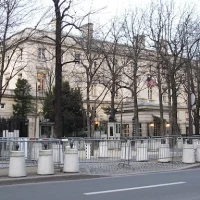Relations were tense in Yemen between the United States and Yemen after the attack of the Naval vessel U.S.S Cole in 2000 and the situation was not helped by the sudden onslaught of Americans. As Mike Metrinko, who arrived on the scene in March 2001, describes it, there was “a huge clash of cultures” among… Read More "Too Fast and Furious — Adult Supervision for the USS Cole Investigation"
Suicide Bombers and the Rapper M.I.A. — The Sad Legacy of the Sri Lankan Civil War
Artistic inspiration, such as it is, can come from the most unexpected of places. Case in point, Grammy-nominated one-hit wonder rapper M.I.A. (2007’s “Paper Planes”), who fills many of her songs with references to the violent conflict in Sri Lanka. Her father, Arul Pragasam, founded the Eelam Revolutionary Organization of Students (EROS), a political Tamil… Read More "Suicide Bombers and the Rapper M.I.A. — The Sad Legacy of the Sri Lankan Civil War"
Dissension, Tension and Succession in the House of Saud
In 1932, Saudi Arabia was established by King Abd al-Aziz and has been ruled by the Saud clan ever since. On the demise of the King, the Crown Prince assumes the throne, with a new Crown Prince traditionally appointed among the sons of Ibn Saud. However, sometimes things don’t go so smoothly. In 1954 the eldest… Read More "Dissension, Tension and Succession in the House of Saud"
Resigning Over the Conflict in El Salvador
Central America in the 1980s became a proxy battleground as the United States supported right-wing leaders against leftist socialist guerrillas who, in turn, were usually funded by the Soviet Union, Cuba and others. In El Salvador, the struggle for power took an ugly turn when Archbishop Óscar Romero, who had openly pleaded for the government… Read More "Resigning Over the Conflict in El Salvador"
Evacuating Uganda — With Style
From 1971-1979, Uganda was under the control of the mercurial Idi Amin, one of the most brutal military dictators ever to rule in Africa. Towards the end of 1973 it became clear that the United States could no longer maintain its embassy in Kampala and would have to shut it down. Deputy Chief of Mission… Read More "Evacuating Uganda — With Style"
A Dream Deferred
What happens to a dream deferred? Does it dry up like a raisin in the sun? Or fester like a sore– And then run? Does it stink like rotten meat? Or crust and sugar over– like a syrupy sweet? Maybe it just sags like a heavy load. … Read More "A Dream Deferred"
Horrible Bosses: Internal Tension at the U.S. Mission in Geneva
After years of serving in Africa, you finally get a nice cushy assignment at the U.S. Mission in Geneva, with your own staff, a large budget, a fancy title, and you don’t even have to worry about the regular office bureaucracy. It should be a dream job. Except your boss is a former used tire… Read More "Horrible Bosses: Internal Tension at the U.S. Mission in Geneva"
Paris is one of the most beautiful and glamorous places in the world. But like most urban centers, it also has a dark side, as shown yet again by the horrifying assault on the satire magazine Charlie Hebdo and the horrific terrorist attacks just a few months later on November 13, 2015, which killed more… Read More "Dark Times in the City of Light"
The Queen of Thailand Deep in the Heart of Texas
There are many hallmarks of a good diplomat — the ability to understand foreign cultures, communications skills, flexibility, the ability to think on one’s feet. One usually thinks of such skills being used in negotiations on peace accords or bilateral treaties and not with what amounts to a high-level sales trip to Nieman Marcus. However,… Read More "The Queen of Thailand Deep in the Heart of Texas"
Returning the Crown of Saint Stephen to post-Cold War Hungary
For centuries, it was the national symbol of a nation. For decades, it was kept in Fort Knox for safekeeping. The Crown of Saint Stephen dates back to the year 1000, when Stephen, a devout Christian and the patron saint of Hungary, became King and Pope Sylvester II gave him the crown as a gift. From… Read More "Returning the Crown of Saint Stephen to post-Cold War Hungary"

